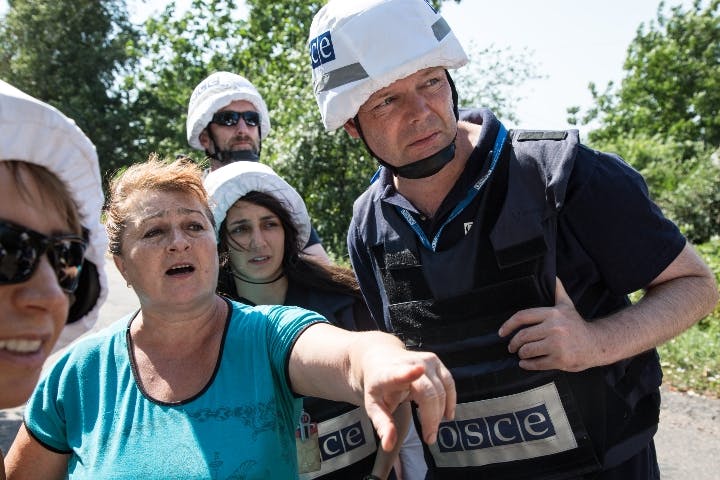Fall 2018
The Cold War Is Over, But the OSCE’s Value is Timeless
– Roger Wicker and Ben Cardin
Amid the alphabet soup of institutional acronyms, many Americans probably have not heard of the OSCE. We know its value firsthand – and the dangers that would come with U.S. retreat.
History has shown that robust engagement in multilateral arenas represents long-term realism: to lead, we must be involved; to protect our national interests and the principles we hold dear, we must remain engaged; and to inspire those who suffer every day under authoritarian regimes, we must hold our own country to the highest standards on the world stage.
Unfortunately, efforts to maintain America’s preeminence in the world have come under increasing pressure in recent years. These challenges are not isolated and are waged on many fronts – economically, militarily, and diplomatically. Some may use these challenges as an excuse to retreat, claiming that engagement in international organizations like the Organization for Security and Cooperation in Europe (OSCE) adds no value. We believe that quite the opposite is true. If we want to continue to lead, protect, and inspire, we need the OSCE’s opportunities for multilateral engagement more than ever.
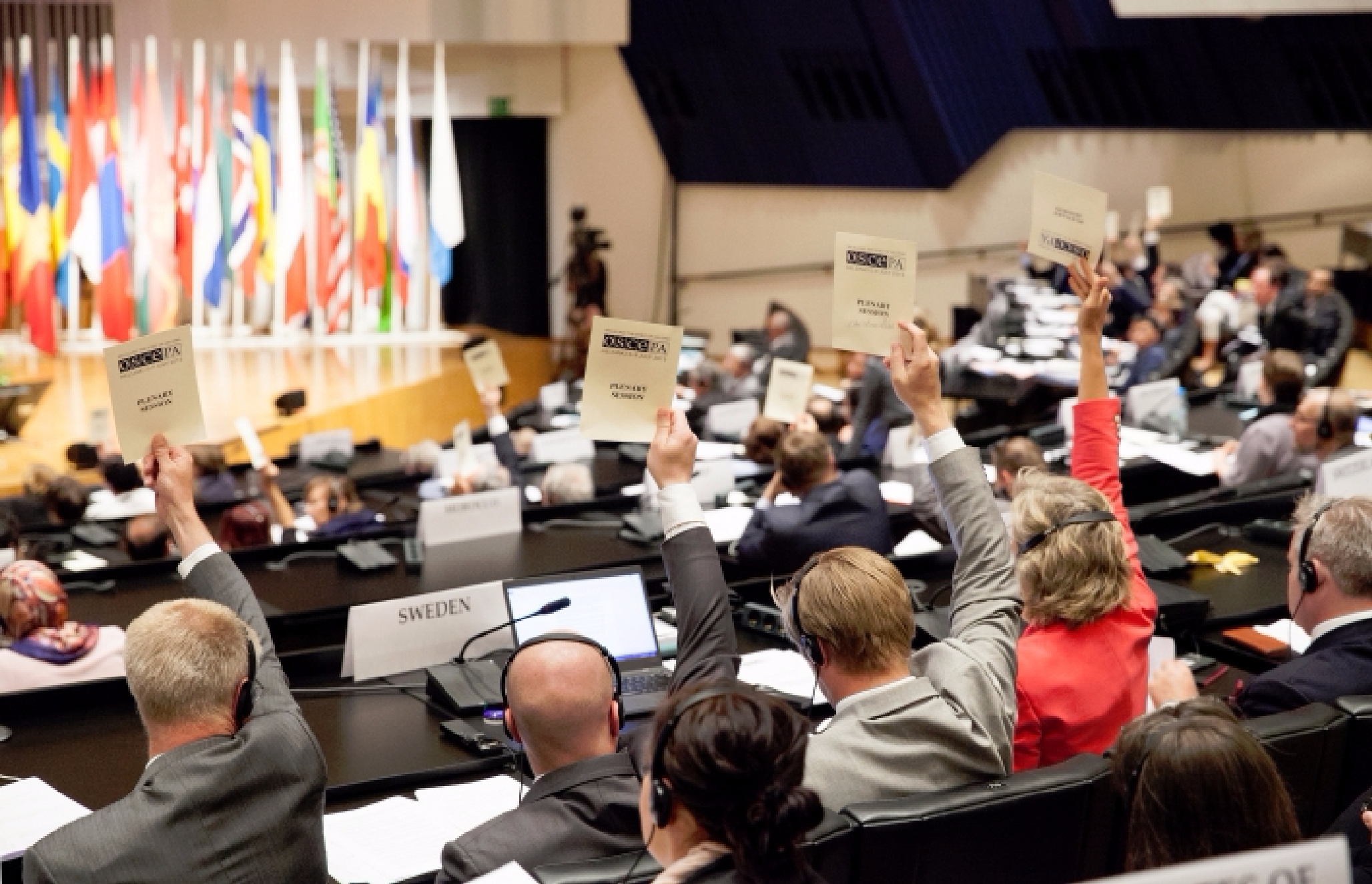
Amid the alphabet soup of institutional acronyms, many Americans probably have not heard of the OSCE, let alone know that it is the largest regional security organization in the world. Comprising 57 countries, it links Vancouver in the West to Vladivostok in the East, spanning North America, Europe, and Central Asia. We are members of the organization’s Parliamentary Assembly, where we have represented our country and our principles in a forum of international lawmakers for a combined 34 years. We have engaged the OSCE, as a whole, even longer. We know firsthand the value of U.S. leadership and sustained high-level engagement in the organization – and conversely, we know the enormous risks that would come with retreat.
A Broader Definition of Security
The essential, enduring value of the OSCE can be traced back to its founding and the ideological transformation that it quietly unleashed. In the 1950s, the Soviet Union first conceived the idea of the Helsinki Final Act. The founding charter of the Conference on Security and Cooperation in Europe, or CSCE, later institutionalized as today’s OSCE, would eventually be signed in 1975. Moscow saw the document as a way to validate post-World War II border changes and tighten its stranglehold on Eastern Europe. The Kremlin, no doubt, also hoped to create an alternative to NATO and weaken U.S. ties to Europe.
As troops massed along the Iron Curtain after the Soviet-led invasion of Czechoslovakia in 1968, Europe began to see some value in greater East-West engagement. The United States saw the Soviet proposal as a damage-mitigation exercise at best. Secretary of State Henry Kissinger famously decried the Helsinki Final Act, saying, “They can write it in Swahili for all I care… The Conference can never end up with a meaningful document.”
Opposition to the Helsinki Final Act was not limited to Foggy Bottom. The Wall Street Journal published the editorial “Jerry, Don’t Go” just prior to President Ford’s departure to sign the document in Finland, reflecting widespread opposition from U.S. foreign policy hawks and Americans across the country who descended from the “captive nations” of Eastern Europe.
What most observers at the time overlooked, however, was the Helsinki Final Act’s uniquely comprehensive definition of “security.” The Act contains 10 principles guiding inter-state relations, including respect for human rights and fundamental freedoms; respect for sovereign equality; recognition of the territorial integrity of states; and the commitment of states to fulfill in good faith their obligations under international law. The integration of human rights into a concept of security was revolutionary.
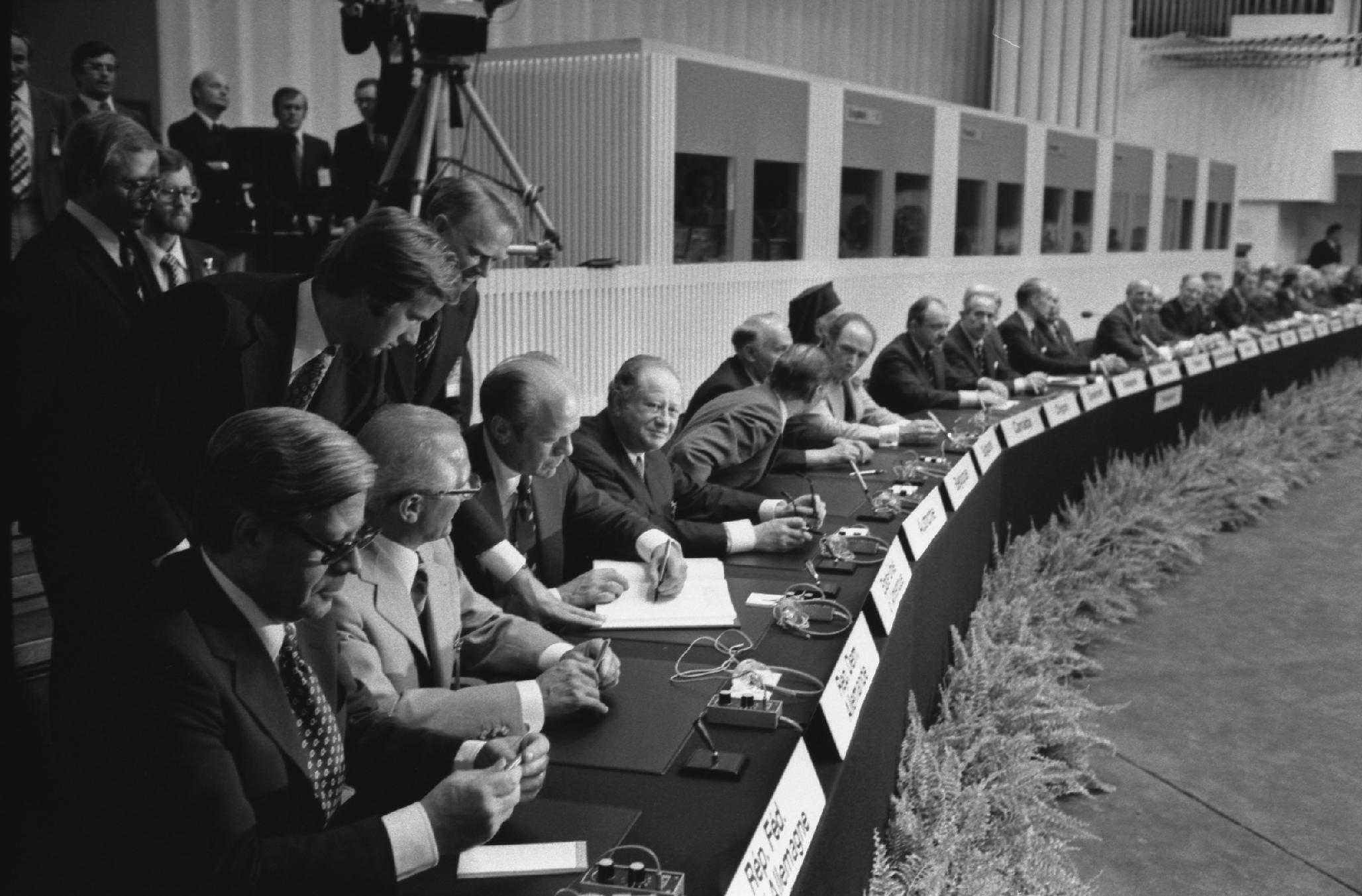
The Act also provided that any country signatory could publicly challenge any other country that wasn’t living up to Helsinki principles, either internally or externally. This was remarkable for its time.
These two innovations made the Act a rallying point for human rights advocates everywhere, especially dissident movements in the one-party communist states of the Soviet bloc. Groups like Charter 77 in Czechoslovakia, Solidarity in Poland, and other monitoring groups in the Soviet Union and Baltic States that were crucial to the eventual collapse of communism in Europe relied on Helsinki commitments in their advocacy.
With U.S. leadership, meetings of the CSCE also became venues for frank exchanges, where countries committing human rights abuses were named and victims identified. The strongest weapons in the U.S. arsenal – democratic ideals, market principles, and the primacy of individual rights – rallied European friends and allies, attracted Soviet satellites, and left Moscow isolated, if not fully convinced.
Today’s Inflection Point
We were both serving in the House of Representatives shortly after the Soviet Union collapsed in the early 1990s. We were aware that the transitions ahead would be difficult, particularly as horrific ethnic cleansing spread in the Balkans and a brutal war was waged in Chechnya. Although we were on opposite sides of the aisle, we were joined in our conviction that liberal democracy would ultimately prevail throughout Europe and into Central Asia.
Unfortunately, our confidence was dramatically misplaced. Thirty years later, instead of the peace and prosperity we expected in the OSCE region, we are at an inflection point, faced with uncertainty and the increasing erosion of the security framework that followed the Cold War. In recent elections, we’ve watched nationalist parties gain a strong foothold in Europe. NATO ally Turkey – one of the world’s most oppressive regimes toward journalists – is succumbing to authoritarian rule, weakening checks on executive power and targeting more than 100,000 perceived opponents of the ruling party in sweeping purges.
Those Helsinki commitments, and their institutionalization over time, empower us to stand up for our values and for comprehensive security at a time in which we absolutely must.
Vladimir Putin continues to violate the sovereignty and territorial integrity of not just Ukraine – where, in areas controlled by Russia, pro-Ukrainian sentiment is met with imprisonment, torture, or death – but also Georgia, where Russia has occupied 20 percent of the country’s territory for more than a decade. The Russian government supports separatists in the Transnistrian region of Moldova, interferes in elections in the United States and Europe, and undermines faith in democratic governments worldwide through cyberattacks and information warfare.
An era of increasing nationalism, Kremlin revisionism, and rising authoritarianism may not, at first, seem to be the best moment to revitalize multilateral diplomacy. But it has been, and will continue to be, in our national interest to promote democracy, the rule of law, and human rights around the world – just as we did more than 40 years ago in the Finnish capital. Those Helsinki commitments, and their institutionalization over time, empower us to stand up for our values and for comprehensive security at a time in which we absolutely must.
In April 2017, we – along with every other senator currently serving on the Helsinki Commission – introduced a resolution urging President Trump to recognize the importance of the Helsinki Final Act and the OSCE as well as their relevance to American national security. We hope the administration will endorse this effort.
A Record of Results
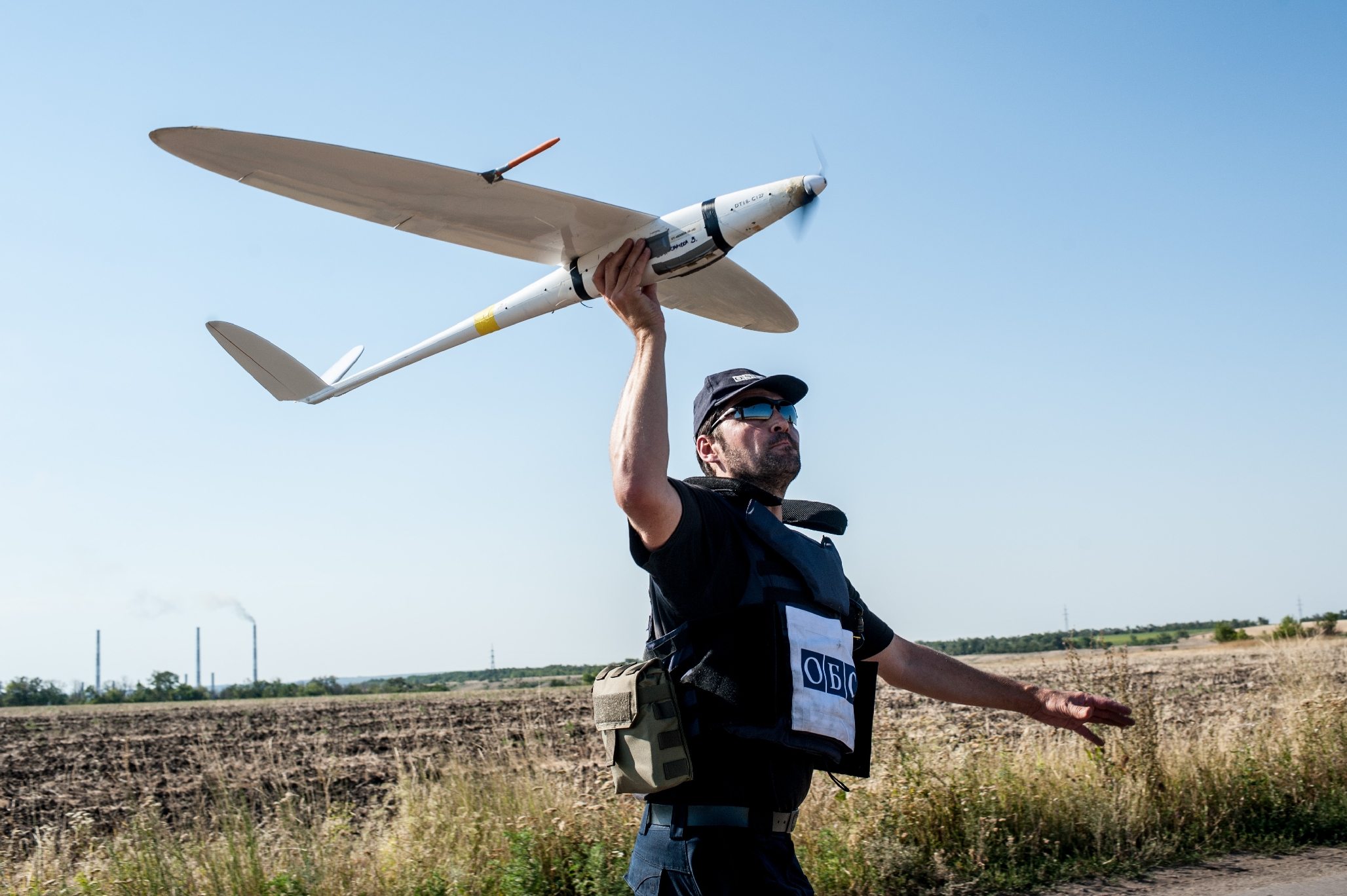
The value of the OSCE and the effectiveness of American involvement are evident in the organization’s more recent evolution and achievements. This is no Cold War relic. We have seen examples of multilateral success in many initiatives, beginning with its quick embrace of newly independent states, from the Balkans to Eastern Europe and Central Asia.
As multiethnic states broke apart, the OSCE created a high commissioner on national minorities in 1992 to address ethnic tensions and proactively prevent conflict between or within states over national minority issues. Participating states developed mechanisms to respond to the most recalcitrant actors, such as the unprecedented suspension of Yugoslavia the same year for the “clear, gross, and uncorrected” violations of Helsinki principles by the regime of Slobodan Milosevic against Bosnia and Herzegovina.
Under OSCE auspices, internal political confrontations in Serbia in 1996 and Albania in 1997 were resolved through high-level engagement before they became a broader threat to peace and prosperity in Europe. The United States led the way, generating the political will to act quickly and with resolve.
Robust field missions also were created in the 1990s to respond to conflicts, first in the Balkans and then extending into Eastern Europe, the Caucasus, and Central Asia. In some places, such as Kosovo, the OSCE often was the only acceptable international monitor or facilitator on the ground, serving as the eyes and ears of the international community, bringing opposing sides together, and mitigating spillover effects in neighboring countries.
Today, the OSCE’s civilian Special Monitoring Mission (SMM) to Ukraine is the only independent observer group in the war zone. Established in 2014 to monitor implementation of the Minsk Agreements, its approximately 700 monitors provide clear and unbiased reporting of ceasefire violations and human costs of the conflict. Approximately half of the U.S. contribution to the OSCE goes toward funding the SMM.
The mission faces challenges, including attempts to sabotage its work and concerns about security. The latter was tragically demonstrated by the death of Joseph Stone, a U.S. paramedic killed last year when his vehicle struck a landmine in separatist-controlled territory. Without the SMM’s reporting, however, we would lack critical information to understand and address ongoing Russian aggression against Ukraine. Kremlin propaganda would have a clear field to disguise the true nature and scale of the conflict.
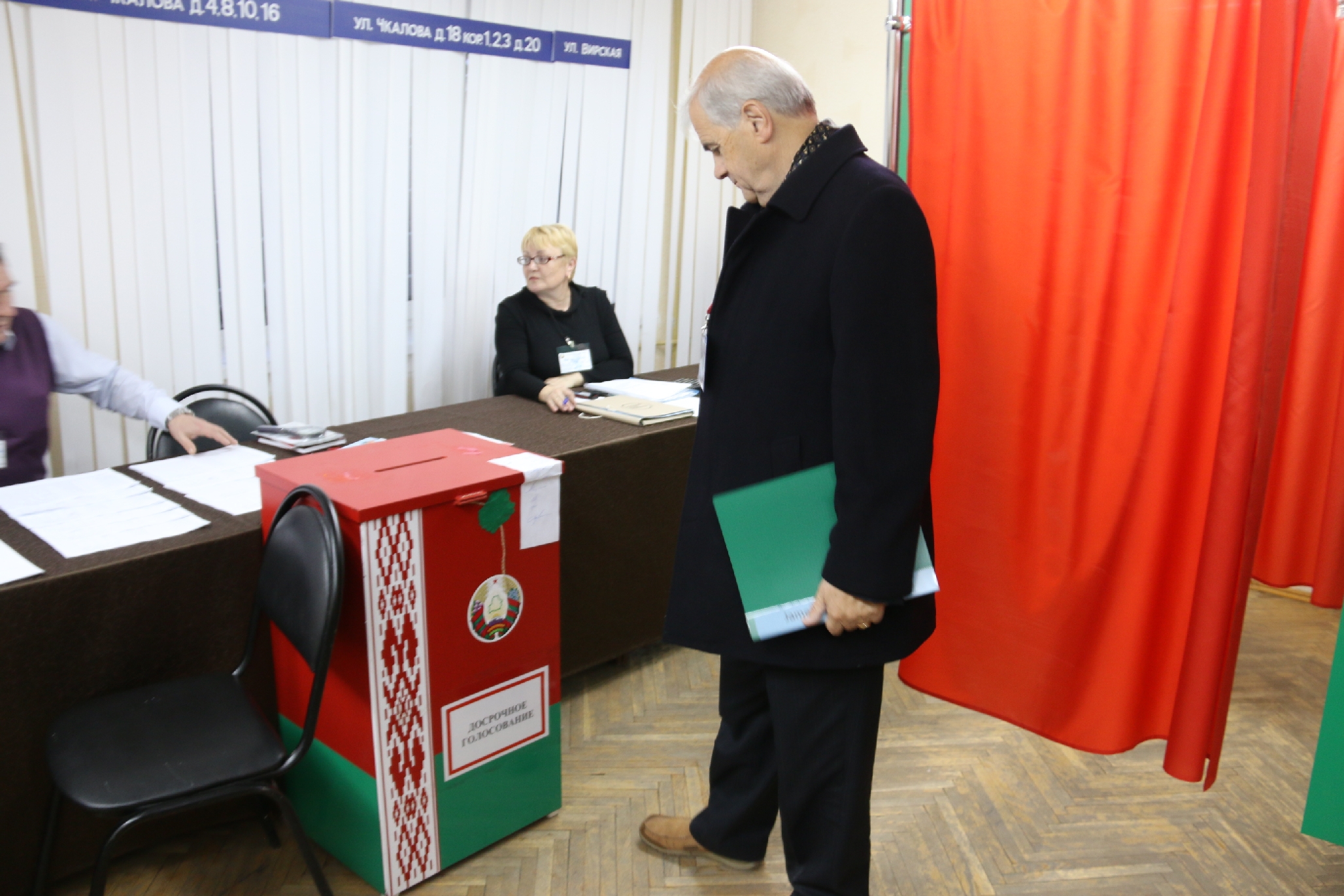
The OSCE also sets the gold standard for election observation across the region. The organization’s trained observers partner with international lawmakers, including ourselves, to analyze election-related laws and systems and the effectiveness of their implementation. The evaluations that these missions produce are critical benchmarks for OSCE countries and support U.S. efforts to promote human rights, democracy, and the rule of law around the world.
Pressure from the organization and its participating states has been a major factor in the release of political prisoners in countries like Azerbaijan. For example, the OSCE Office for Democratic Institutions and Human Rights, the OSCE Representative on Freedom of the Media, and the OSCE Parliamentary Assembly publicly condemned Baku for its targeting of investigative journalist Khadija Ismayilova and the broader use of its judicial system to repress political opponents, journalists, and minorities. The Helsinki Commission also weighed in. In May 2016, Ismayilova was released from prison.
Our actions in this and similar cases demonstrate global leadership. We welcome the recent nomination of a new U.S. permanent representative to the OSCE. This important post has remained vacant for far too long. We urge our Senate colleagues to swiftly consider the nominee, who will be responsible for leading America’s vigorous defense of democracy and human rights in the region.
Russian Foreign Minister Sergei Lavrov attends OSCE ministerial meetings, where he easily – and with great success – engages with senior officials from around the region. That alone should encourage our secretary of state to be present.
Let us also not overlook the fact that our work in the OSCE in relation to Russia is not simply to counter Moscow’s anti-democratic ambitions. Follow-up meetings to the original Conference on Security and Cooperation in Europe became one of a shrinking number of places where East-West dialogue could take place during the Cold War. Likewise, after Russia was suspended from the G8 in March 2014, today’s OSCE provides one of the few remaining opportunities to engage with Russia and hold the Kremlin accountable to principles it has endorsed.
Russian Foreign Minister Sergei Lavrov attends OSCE ministerial meetings, where he easily – and with great success – engages with senior officials from around the region. That alone should encourage our secretary of state to be present. Secretary Tillerson attended the 2017 ministerial, and we urge Secretary Pompeo to do the same.
Future Challenges
Along with successes, we also have seen areas where multilateralism has fallen short. Areas like Nagorno-Karabakh, Transnistria, Chechnya, Abkhazia, and South Ossetia have consumed OSCE attention and resources, but unfortunately, the organization’s actions have not thawed these frozen conflicts. The OSCE may have kept things from getting worse than they might have been otherwise; this is something to praise, but cannot yet be counted as a win.
These efforts have been hindered in part by the otherwise positive requirement that major decisions in the organization require consensus. This rule is vital to the OSCE’s success. The organization can convene all parties on an even footing and – because no country can claim that it didn’t voluntarily agree to its commitments – the rule gives unique force to the OSCE’s actions. However, decision-making by consensus also allows a single intransigent country to wield its veto as a weapon, even in cases of otherwise overwhelming agreement.
In 2008, Russia successfully blocked the OSCE from establishing a field mission in Georgia as Russian-backed separatists occupied South Ossetia and Abkhazia. Since then, resistance to hosting or authorizing field missions, a core capability of the OSCE, has spread. Belarus kicked out its OSCE mission in 2011. Azerbaijan forced the mission in Baku to close in 2015, and two years later, it insisted on the shuttering of a mission in Armenia. Mongolia, the newest OSCE participating state, has repeatedly requested a mission to foster its continued democratic development and build closer ties with other participating states. Moscow consistently blocks that request.
A related and ongoing problem is the lack of transparency of the OSCE’s decision-making. Opening its official deliberations to the public would help make those countries that thwart progress more broadly accountable for their recalcitrance.
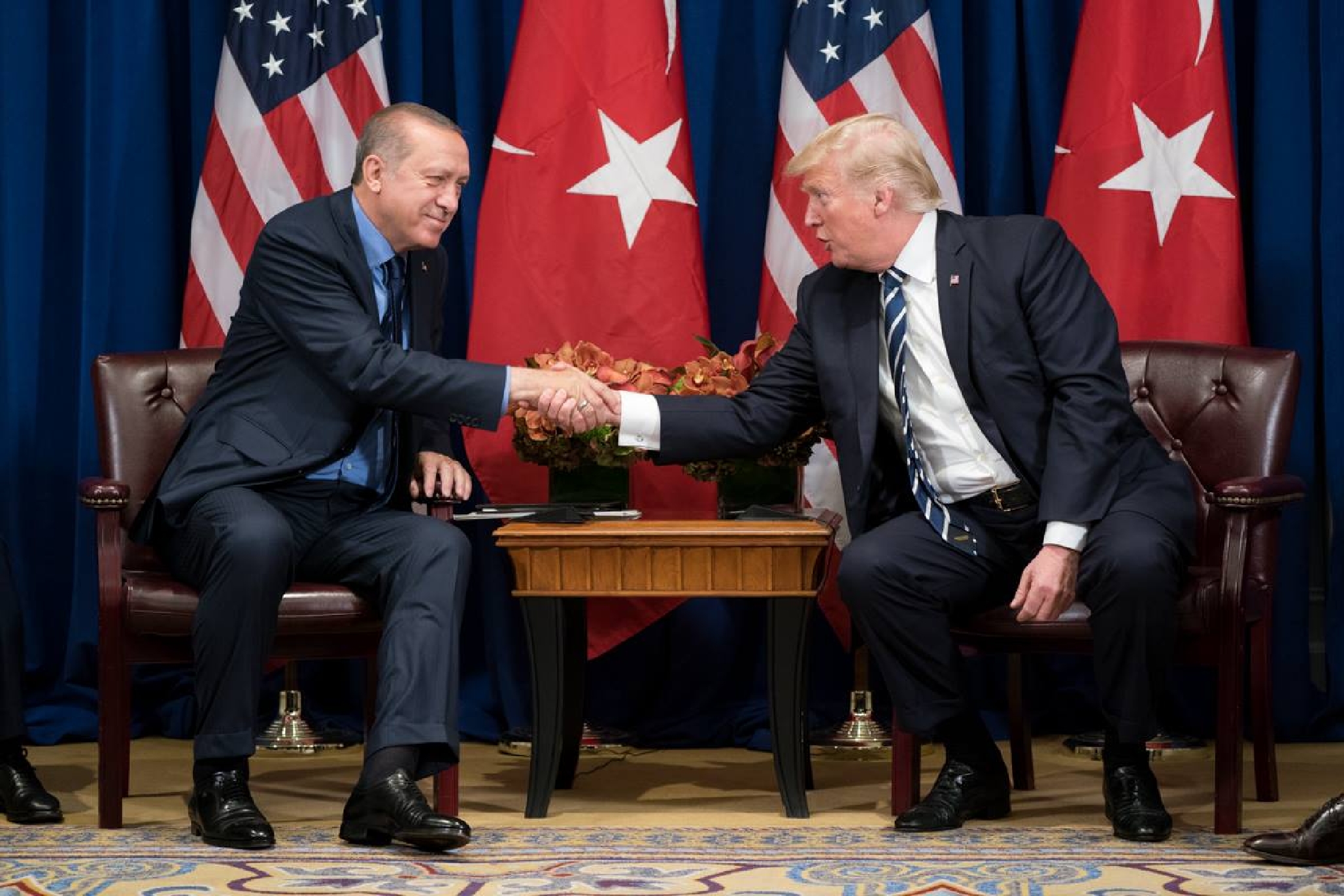
A more recent challenge comes from the government of Turkey. Ankara continues to use the 2016 coup attempt as pretext for not only violently repressing its citizens and detaining others, including Americans, but also for limiting the participation of non-governmental organizations in certain OSCE meetings. The OSCE is the only international organization that allows NGOs to participate equally with governments in meetings on human rights commitments, allowing these groups to raise their concerns directly. If Turkey has its way, human rights groups might be denied a seat at the table. It is easy to imagine which countries quietly hope this effort will succeed. The United States must continue to make it clear that it is not one of them.
Indeed, the moral here is that the United States should not only support the strengths and potential of the OSCE, but we must also be present and potent when progress and principles are challenged within the organization.
Our colleagues in both chambers of Congress have the passion and determination to do just that. In these days of partisan discord, we must remember – and treasure – the fact that Congress is broadly committed to the principles enshrined in the Helsinki Final Act: respect for human rights and fundamental freedoms, democratic principles, and liberty. We see this in the establishment of the Helsinki Commission itself, a unique agency conceived by Congress to strengthen the legitimacy of human rights monitoring, defend those persecuted for acting on their rights and freedoms, and ensure that violations of Helsinki provisions are given full consideration in U.S. foreign policy.
The OSCE’s broad membership and comprehensive definition of security make it an ideal platform to advocate for our interests in a vital region. Its institutions remain singularly placed to moderate regional conflicts, promote respect for human rights, and safeguard essential elements of democracy. We have not only the right, but also the duty, to hold countries responsible if they fail to adhere to the basic principles that we all agreed to in 1975.
We also have the responsibility to hear and consider other participating states when they feel that the United States is not fully meeting our commitments. Leading by example means that we must be held accountable, too.
At this critical juncture, when the rules-based order appears particularly fragile, any weakening or absence of the OSCE could irreversibly damage the chances for democracy and peace in the region. We must not allow that to happen – and the key is our own steadfastness, in words and deeds.
***
Roger Wicker (@SenatorWicker) is chairman of the U.S. Helsinki Commission and a vice president of the OSCE Parliamentary Assembly. A member of the Republican Party, he has represented Mississippi in the Senate since December 2007. He previously represented Mississippi for 13 years in the House of Representatives.
Ben Cardin (@SenatorCardin) is ranking Senate member of the U.S. Helsinki Commission. He serves as special representative on anti-Semitism, racism, and intolerance for the OSCE Parliamentary Assembly. A member of the Democratic Party, he has represented Maryland in the Senate since January 2007 after 20 years in the House of Representatives.
Cover photo: A local resident speaks to members of the OSCE Special Monitoring Mission to Ukraine, Donetsk region, August 9, 2017. (Courtesy of OSCE SMM/flickr)
